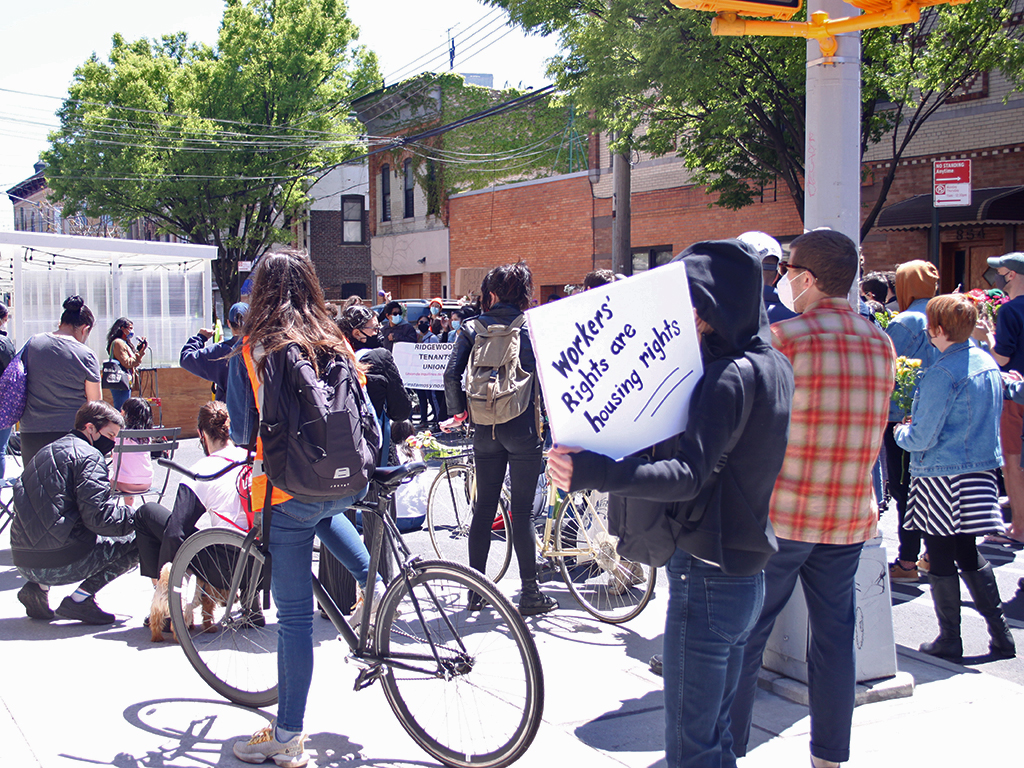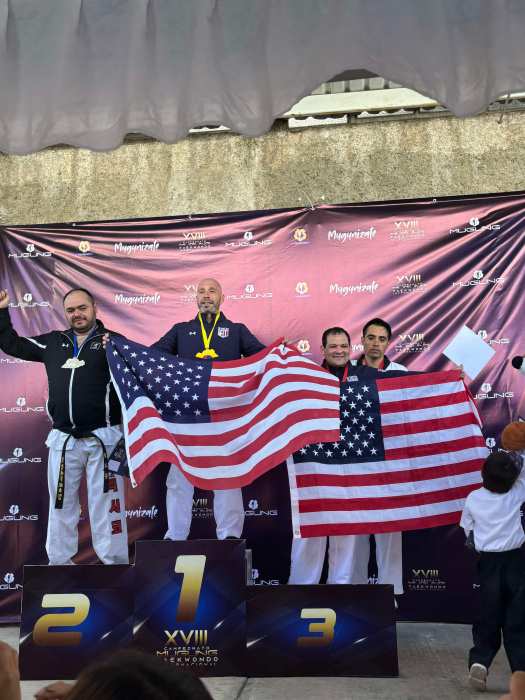More than 100 people marched in celebration of International Workers Day — while calling for no evictions nor displacement — in Ridgewood on Saturday, May 1.
Organized by the Ridgewood Tenants Union (RTU), the march began at Venditti Square where some members of the tenants association spoke about how the COVID-19 pandemic has disproportionately impacted excluded workers.
“So many of our workers are tenants, they’re immigrants, they’re people of color, and they’ve been excluded from systems of government like relief of so many different kinds,” RTU member Ahtziri Campos said.
Campos also mentioned the hunger strike that many excluded workers underwent in March in order to call on the state legislature to include a fund for excluded workers. Ultimately, a $2 billion fund for excluded workers was included in this year’s state budget, and is in the process of getting implemented.
“RTU and all of you are celebrating and fighting for them,” Campos said. “Our mission is very simple — fighting to build people power.”
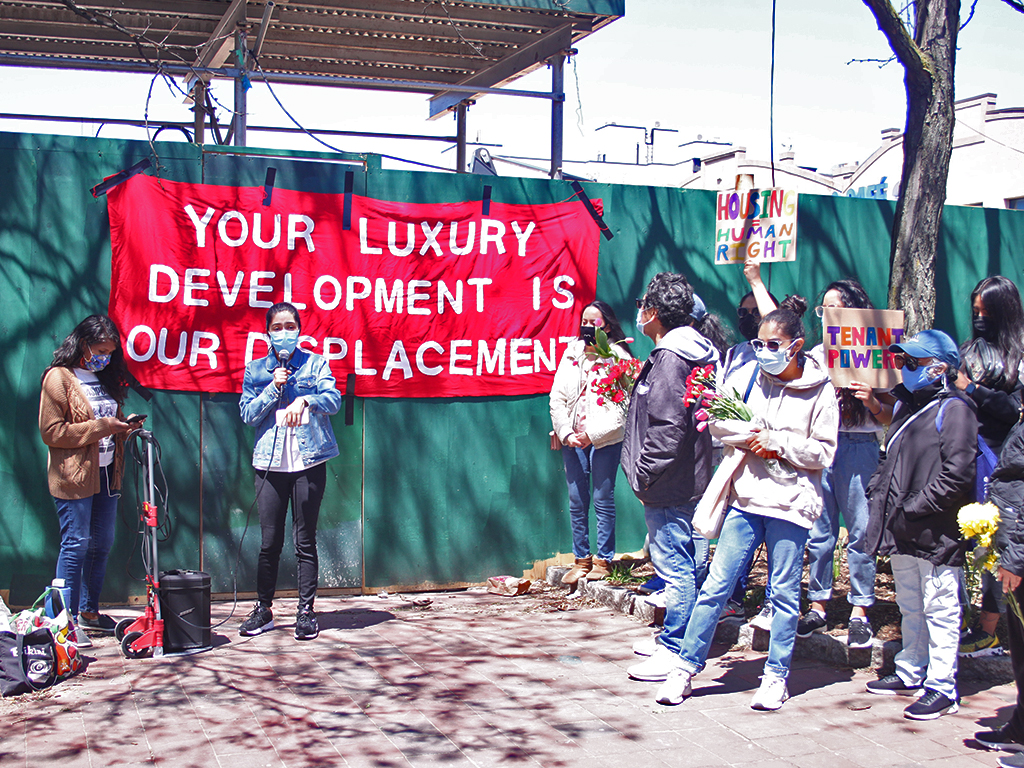
Another RTU member, Bonnie Gil, then spoke about the 17-story tower, Myrtle Point, proposed right at the site of Venditti Square. The stalled tower, owned by AB Capstone and Arch Companies, has been under fire by RTU and local elected officials for years.
Gil said in addition to bringing in Target, “an anti-union” chain, it also “breaks her heart” that many of the workers who will build the tower won’t be able to afford to live there.
“We are marching against predatory developers and landlords who are taking over our neighborhoods who don’t care about the harm they cause to our community,” Gil said.
The group then kicked off their march up Myrtle Avenue, chanting, “eviction-free NYC,” “housing is a human right,” “the rent is too damn high” and “get up, get down, there’s a housing crisis in this town,” along the way.
They stopped at the newly opened restaurant, Rolo’s, on Onderdonk Avenue, where several people ate outside. The restaurant has ignited conversations about gentrification among many community members since it opened in January.
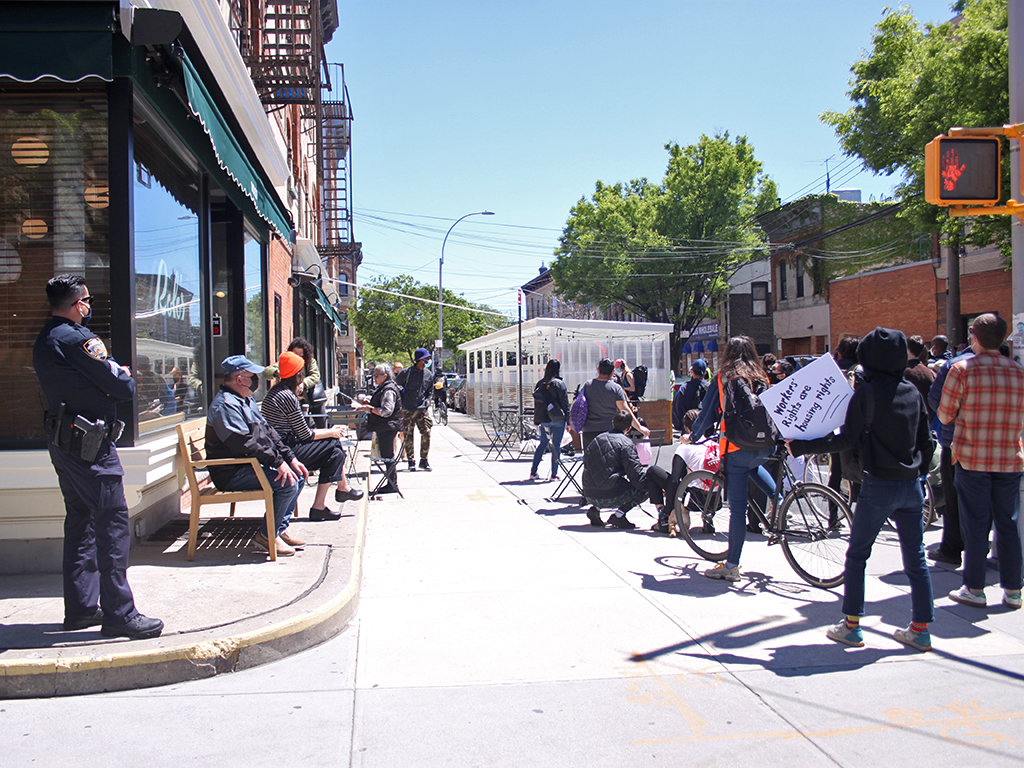
There, RTU members spoke about another developer, Kermit Westergaard (a part owner of Rolo’s), who they say is displacing longtime residents. Westergaard is a developer who’s purchased several buildings in Ridgewood in the past decade, renovated them and put them back on the market.
Ana Gil, 23, a lifelong Ridgewood resident, shouted “how dare you,” toward the restaurant, saying she’s never witnessed families being displaced to build expensive housing.
“This is disgraceful,” Gil shouted.
RTU organizer Raquel Namuche said one of their members was displaced by Westergaard.
“He’s curating the neighborhood to his liking, and his vision excludes working-class people such as myself, my family and my neighbors,” Namuche said. “We totally understand that everything must change, but that change should not come at the cost of our working class neighbors.”
RTU member Kira Josefsson said to combat displacement, they’re working to build a community where everyone is working together to “hold these developers accountable.”
“We want to foster a neighborhood economy based on solidarity and cooperation that will ensure that all of our neighbors have a sustainable way to live in dignity, that nobody is ever at risk of being displaced from this neighborhood, from their homes,” Josefsson said.
The march began again on Onderdonk Avenue. Some of the signs held by the dozens of marches read “Workers against displacement” and “People Over Profit.”
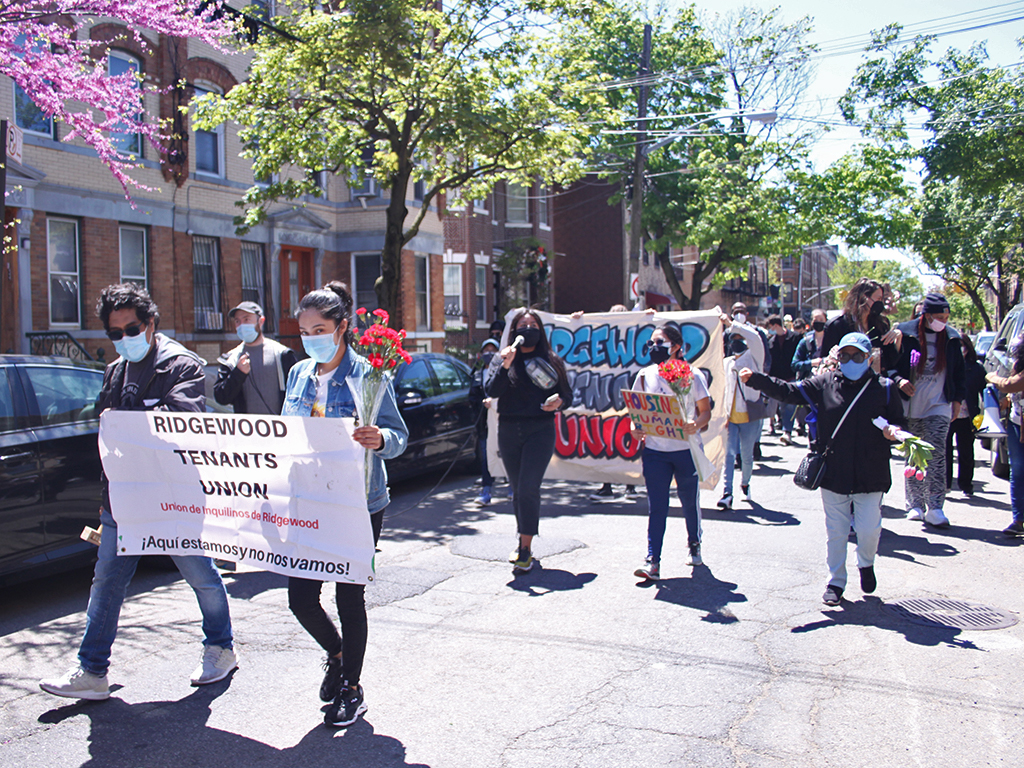
The group then stopped at the corner of Fresh Pond Road and Myrtle Avenue, where they spoke about their efforts to help unhoused neighbors.
Isa, an RTU member, said the site is where “harm has continuously been inflicted” on their homeless neighbors. Isa said the city and the NYPD have increased “clean up sweeps,” in which they force homeless individuals to move from their space and remove their belongings, despite guidance from the CDC to leave unhoused people where they are to stop the spread of COVID-19.
“The city’s callous and violent approach to addressing street homelessness is no way to solve the crisis,” Isa said. “We cannot force people into shelters that are unsafe, we cannot throw away their belongings and take away the spaces that they have community in, that they sleep in at night. There’s only one common sense, real solution to solve homelessness, and that is housing for all.”
For a year, RTU members have checked on homeless New Yorkers in Ridgewood and Bushwick every Wednesday and Saturday, providing them with food and items they may need.
Bailey, an RTU member, said the outreach project began in response to the city’s subway closures, in which homeless people were forced out of the stations at night.
“Since last spring we’ve grown immensely, both in our work’s capacity and with the relationships,” Bailey said. “But this year, our community lost four incredible members.”
Bailey spoke fondly about the four unhoused New Yorkers to remember them after they recently passed away. One of them was Pawel Felicjancik, who stayed at an underpass at Fresh Pond Road and Myrtle Avenue. After Felicjancik passed on Easter Sunday, a memorial service was held at All Saints Priory.
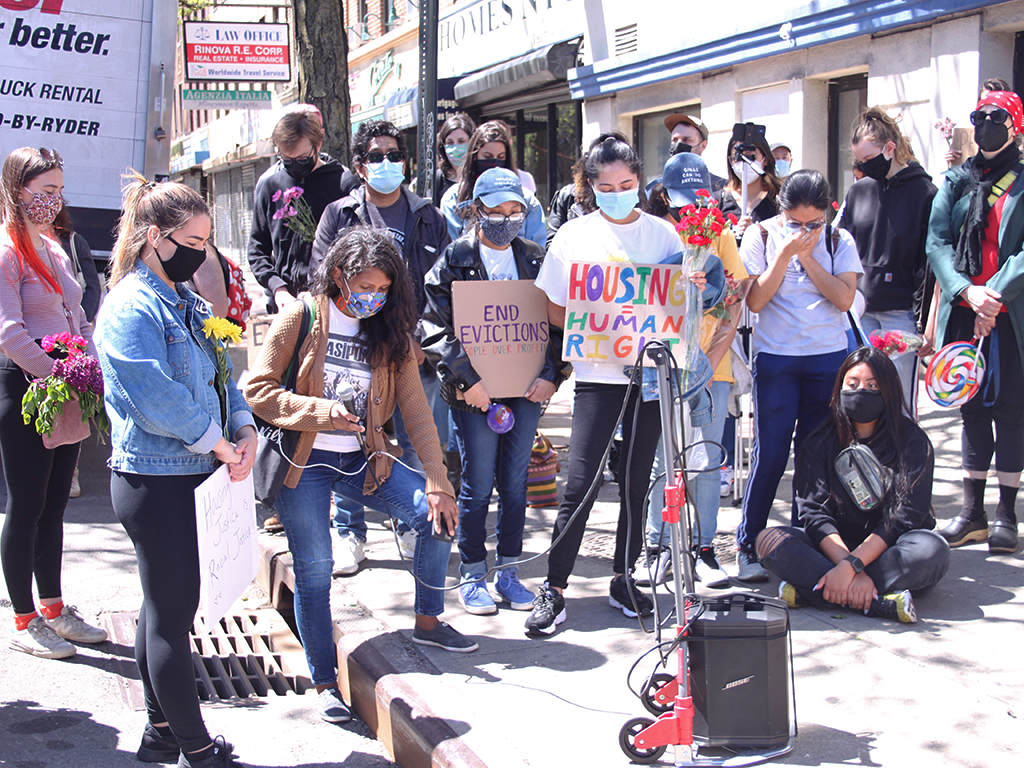
“He was someone who lived by his own code that was rooted in his belief in comradeship and people’s innate humanity,” Bailey read from a message written by another RTU member. “His spirit is deeply missed in this community.”
The group stopped for a moment of silence for the recently passed community members, then collected flowers that individuals held on to throughout the march to leave on a wooden bench next to a makeshift bed where they said Felicjancik stayed.

The march continued on Myrtle Avenue making another stop at RTU’s community fridge, hosted by Kings Juice Bar located at 955 Seneca Ave., which is owned by local business owner Adrian King.
There, RTU members spoke about the fridge, where anyone and everyone can leave and take food, saying, “It’s not just a source of food; but a source of community.” For them, it’s also a symbol of their fight against gentrification.
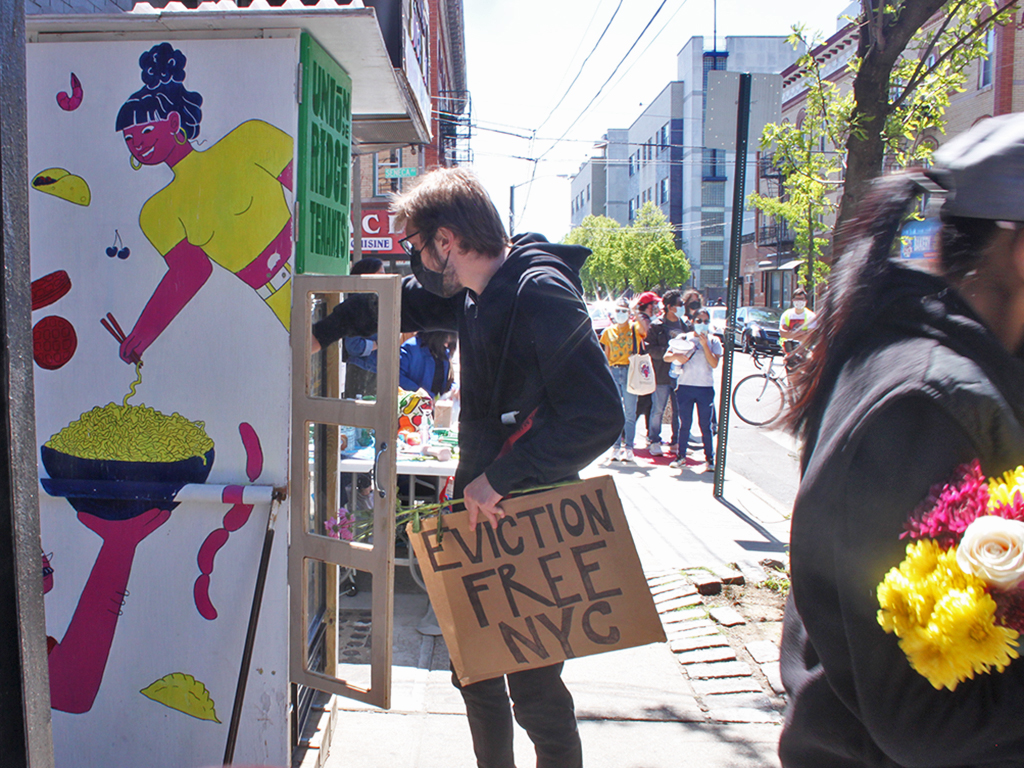
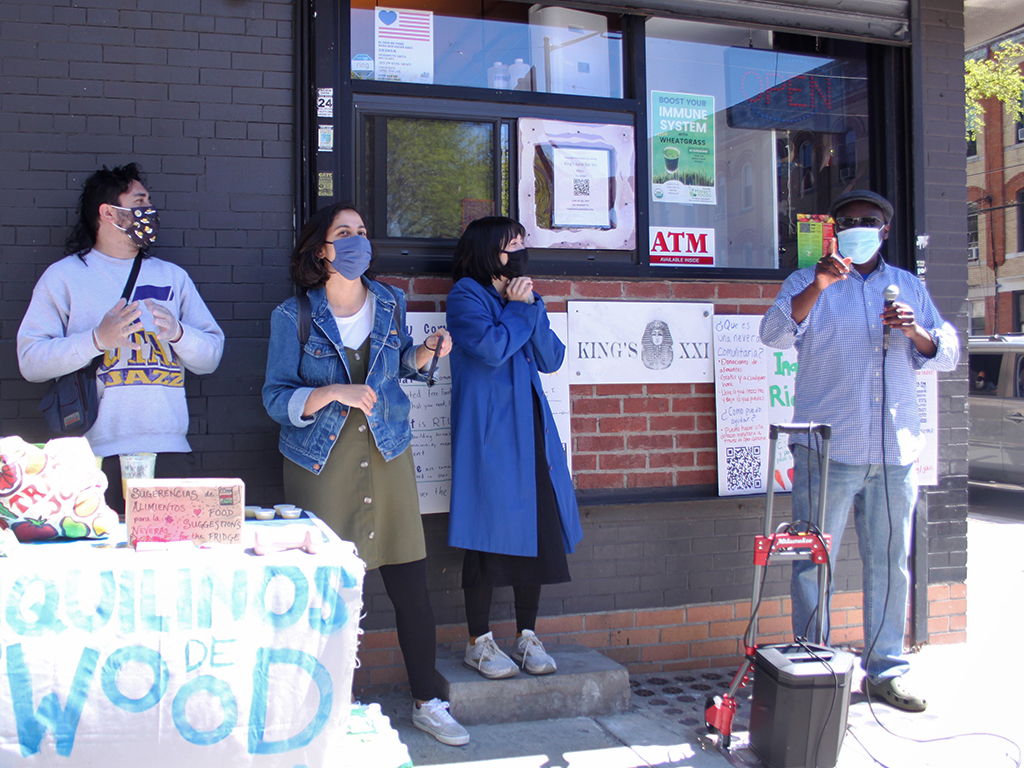
King, who’s lived in the area for more than 40 years, said he’s proud of their work and encouraged them to continue.
“You are thoughtful. You have love for this community. You cater to this community,” King said. “You did nothing but share the love, and that is infectious because everybody I see comes and they started to contribute because of the love, the attention, the care and the dedication that you guys give.”
The march then continued on Myrtle Avenue, toward Myrtle and Wyckoff Plaza, where it ended with music from individuals with instruments including trumpets and drums.


RTU members also spoke about Jorge Jimenez, a 48-year-old unhoused neighbor who died after suffering a stroke last Monday. Jimenez used to stay at the Myrtle-Wyckoff L train station.
Jimenez’s passing was particularly devastating for RTU members, as it was on the same day when he was supposed to move into a new room they found for him and two weeks before he was supposed to start a new job.
“Jorge lost his job due to the pandemic and was an excluded worker, who was subsequently illegally evicted and experienced homelessness for the first time,” Bailey said. “Jorge was a Maná fan and a father. He was incredibly warm and was looking forward to getting back on his feet.”
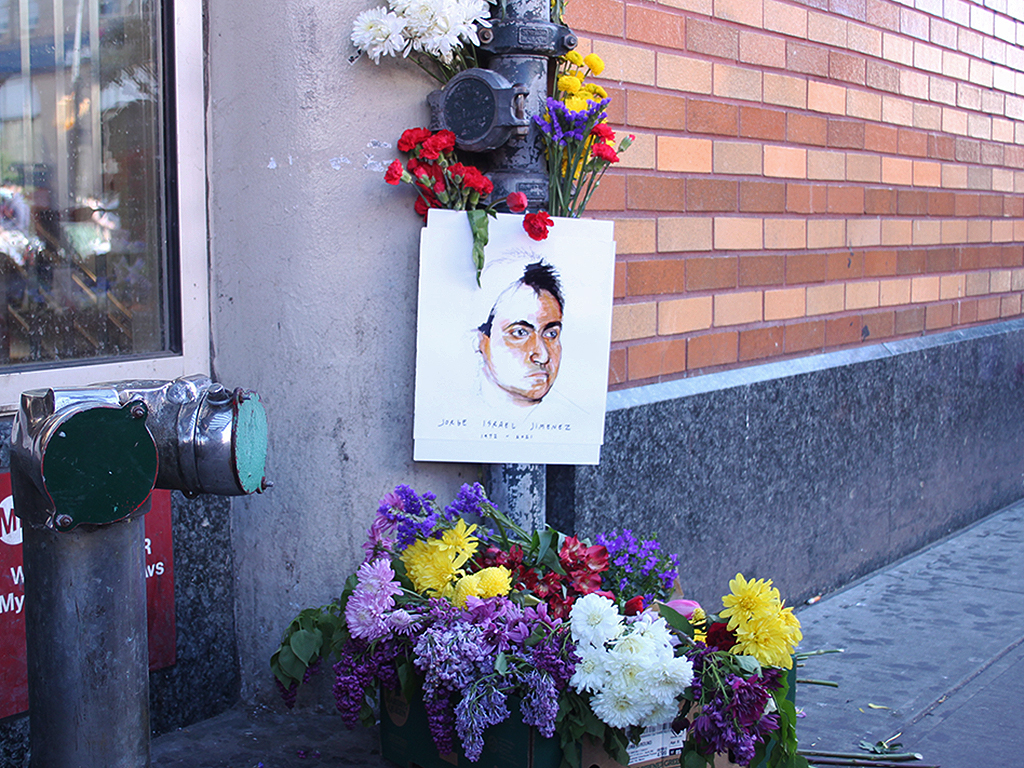
Namuche said they created a GoFundMe for Jimenez, in order to give him a proper burial and send his remains to his family in Texas. She emphasized that the tragedy is just one reason why they’re fighting for housing for all.
“We need everyone to work together to create a community where our neighbors aren’t harassed, where racist council members don’t get to dictate who they’re advocating for and who they think is important,” Namuche said. “We’ve got to build all of this from the bottom up and we need all of you to help us create that community.”
For Maria Gil, what happened to Jimenez is a clear example of what may happen to undocumented workers and other at-risk communities who don’t receive the help they need after a devastating pandemic impacted their livelihoods.
“As we know, this has been a very difficult year where the workers who really move the economy of this country have been excluded,” Gil said.
Gil, an RTU member, helped organize a sleep-out at the plaza last summer to demonstrate what potential mass evictions may look like if the city and state doesn’t prevent them. While lawmakers voted to extend the eviction moratorium until Aug. 30 and there are funds to help with rent relief, Gil said that’s not a solution for those who need it the most.
“Extending a moratorium is not enough, that’s like putting a Band-Aid on a wound that’s already infected. What we need is a universal relief fund for all families,” Gil said. “Landlords have profited for many years from residents who have lived in their buildings for a long time, now they need to give a little of what they already received, and have compassion for those who are living there, the families who are living there. Don’t evict them, wait for help to come or for them to get a job and recover. They’re human beings and they deserve to stay in their homes.”
This story was updated on May 4 at 4 p.m.

